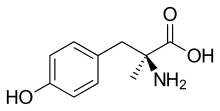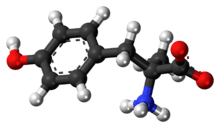Metirosine
Metirosine (INN and BAN; α-Methyltyrosine, Metyrosine USAN, AMPT) is an antihypertensive drug. It inhibits the enzyme tyrosine hydroxylase and, therefore, catecholamine synthesis, which, as a consequence, depletes the levels of the catecholamines dopamine, adrenaline and noradrenaline in the body.
 | |
 | |
| Clinical data | |
|---|---|
| Trade names | Demser |
| AHFS/Drugs.com | Consumer Drug Information |
| ATC code | |
| Pharmacokinetic data | |
| Elimination half-life | 3.4–3.7 hours |
| Identifiers | |
IUPAC name
| |
| CAS Number | |
| PubChem CID | |
| IUPHAR/BPS | |
| DrugBank | |
| ChemSpider | |
| UNII | |
| KEGG | |
| ChEMBL | |
| CompTox Dashboard (EPA) | |
| ECHA InfoCard | 100.010.546 |
| Chemical and physical data | |
| Formula | C10H13NO3 |
| Molar mass | 195.215 g/mol g·mol−1 |
| 3D model (JSmol) | |
SMILES
| |
InChI
| |
| | |
Clinical use
Metirosine has been shown to suppress catecholamine synthesis and alleviate symptoms related to catecholamine excess, including hypertension, headache, tachycardia, constipation, and tremor.[1] Metirosine is primarily used to reduce these symptoms in patients with pheochromocytoma.[2] It is contraindicated for the treatment of essential hypertension.
However it is now rarely used in medicine, its primary use being in scientific research to investigate the effects of catecholamine depletion on behavior.[3] There is evidence that catecholamine depletion causes an increase in sleepiness that is more pronounced than sleep deprivation, and that the fatigue lingers after the drug is discontinued. Negative mood is also a reported side effect of catecholamine depletion, although this is reported less consistently than sleepiness.[4]
See also
References
- Naruse, Mitsuhide; Satoh, Fumitoshi; Tanabe, Akiyo; Okamoto, Takahiro; Ichihara, Atsuhiro; Tsuiki, Mika; Katabami, Takuyuki; Nomura, Masatoshi; Tanaka, Tomoaki (2018). "Efficacy and safety of metyrosine in pheochromocytoma/paraganglioma: a multi-center trial in Japan". Endocrine Journal. 65 (3): 359–371. doi:10.1507/endocrj.EJ17-0276. ISSN 0918-8959.
- Green KN, Larsson SK, Beevers DG, Bevan PG, Hayes B (August 1982). "Alpha-methyltyrosine in the management of phaeochromocytoma". Thorax. 37 (8): 632–3. doi:10.1136/thx.37.8.632. PMC 459390. PMID 7179194.
- O'Leary OF, Bechtholt AJ, Crowley JJ, Hill TE, Page ME, Lucki I. Depletion of serotonin and catecholamines block the acute behavioral response to different classes of antidepressant drugs in the mouse tail suspension test. Psychopharmacology. 2007 Jun;192(3):357-71. PMID 17318507
- McCann, Una D.; Penetar, David M.; Shaham, Yavin; Thome, David R.; Sing, Helen C.; Thomas, Maria L.; Gillin, J. Christian; Belenky, Gregory (June 1993). "Effects of Catecholamine Depletion on Alertness and Mood in Rested and Sleep Deprived Normal Volunteers". Neuropsychopharmacology. 8 (4): 345–356. doi:10.1038/npp.1993.34. ISSN 0893-133X.